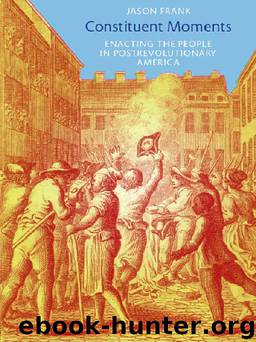Constituent Moments by Jason Frank

Author:Jason Frank [Frank, Jason]
Language: eng
Format: epub
Tags: ebook, book
Publisher: Duke University Press
Published: 2010-01-04T02:00:00+00:00
II
Where there is no revelation, the people perish. PROVERBS 29:1829
Early commentaries on Wieland sometimes read the novel as an Enlightenment critique of religious enthusiasm, as “a sermon against credulity and religious fanaticism” and in favor of “all the advanced social and political opinions fathered by the French Revolution.”30 As already indicated, the novel’s relationship to Enlightenment and enthusiasm is actually much more complicated. Wieland is centrally concerned with the problem of enthusiasm, but it takes these problems—associated with the extratextual authority of voice and the confusion of imagination with revelation—to be part of a much broader cultural phenomenon than these earlier readings of the novel suggest. Brown’s novel is a critique of both fanaticism and the optimistic moral psychology associated by these critics with “Enlightenment,” emphasizing their underlying similarities rather than their differences.31 As Larzer Ziff notes, the novel “penetrates beneath the principles of the optimistic psychology of his day, and recognizes the claims that Calvinism makes on the American character.”32 Brown’s novel establishes continuities between the dangers of enthusiastic voice and the dangers attending democratic appeals to the voice of the people. In the novel the disavowed specter of religious enthusiasm haunts the optimistic self-confidence of the democratic present. The Jeffersonian dictum that “the earth belongs in usufruct to the living,” and that “the dead have neither powers nor rights over it,” is, Brown suggests, profoundly deluded.33 His novel wars with what Judith Shklar calls Jefferson’s “politics of perpetual newness,” and what Catherine Holland calls the broader eighteenth-century American “fantasy of pastlessness, of political and historical unfetteredness.”34 Clara’s opening account of her family history establishes the haunting power of the dead over the living, and shows it to be an inheritance and patrimony of violence.
Clara’s narrative of her family history begins with her grandfather, whom she describes as “the founder of the German theater,” and whose life was “spent in the composition of sonatas and dramatic pieces” (7). The grandfather’s artistic sensibility and cultivated imagination earn him fame, but he is unable to directly pass this inheritance on to his son. As with all paternal relations in Wieland, that between Clara’s father and grandfather is interrupted by unexpected and early death. While Clara’s father is orphaned at an early age, he nonetheless inherits his own father’s aesthetic sensibilities, though of a more melancholic sort. He is prone to a “habit of morose and gloomy reflection.” While not a bookish man, it is a book that marks the great shift in his life, a book of the enthusiastic heresy of the free spirit.35 Clara reports that at an early age her father came across a book written by “one of the teachers of the Albigenses, or French Protestants.” The fateful passage that catches his eye—“Seek and ye shall find”—inaugurates her father’s quest of spiritual discovery that draws him first into an intensive study of scripture and then beyond written scripture to the arresting call of divine voice.
The French Prophets, or Camisards (“short shirts”), the elder Wieland’s particular route into enthusiasm, were
Download
This site does not store any files on its server. We only index and link to content provided by other sites. Please contact the content providers to delete copyright contents if any and email us, we'll remove relevant links or contents immediately.
The Secret History by Donna Tartt(19028)
The Social Justice Warrior Handbook by Lisa De Pasquale(12182)
Thirteen Reasons Why by Jay Asher(8883)
This Is How You Lose Her by Junot Diaz(6872)
Weapons of Math Destruction by Cathy O'Neil(6261)
Zero to One by Peter Thiel(5782)
Beartown by Fredrik Backman(5734)
The Myth of the Strong Leader by Archie Brown(5491)
The Fire Next Time by James Baldwin(5423)
How Democracies Die by Steven Levitsky & Daniel Ziblatt(5211)
Promise Me, Dad by Joe Biden(5139)
Stone's Rules by Roger Stone(5079)
A Higher Loyalty: Truth, Lies, and Leadership by James Comey(4946)
100 Deadly Skills by Clint Emerson(4911)
Rise and Kill First by Ronen Bergman(4775)
Secrecy World by Jake Bernstein(4738)
The David Icke Guide to the Global Conspiracy (and how to end it) by David Icke(4696)
The Farm by Tom Rob Smith(4500)
The Doomsday Machine by Daniel Ellsberg(4481)
